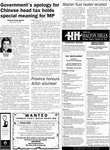Government's apology for Chinese head tax holds special meaning for MP
- Publication
- Independent & Free Press (Georgetown, ON), 28 Jun 2006, p. 5
- Full Text
An apology last week from the federal Conservative government for a discriminatory tax imposed on Chinese immigrants to Canada holds special meaning for Michael Chong. The Conservative MP for Wellington-Halton Hills sees it as a promise that his father's experiences as an immigrant from Hong Kong will never be repeated. "It's a recognition of the work that people like my father did in coming to this country and building this country to what it is today," Chong said. "This symbolically states that the government of Canada is committed to building a just and equitable society." About 81,000 Chinese had to pay a head tax to enter Canada-- $50 between 1885 and 1903, and $500 for the next 20 years. Then in 1923, Chinese immigration was effectively banned until 1947. Prime Minister Stephen Harper apologized for the tax, and offered $20,000 in compensation for any living head-tax payers or their widows. It's estimated about 400 people will be eligible. Chong's late father, Paul, immigrated to Canada from Hong Kong in 1952-- five years after the Chinese exclusion act was repealed. It was difficult for him to find work and adjust to life in a new country, Chong said. "I can tell you he faced barriers that I will never know, and he faced challenges that I never faced and I will never face," he said. While his family never had to pay the head tax, the issue still resonates among the Chinese-Canadian community, said Chong, who noted there are more than 1.5 million Canadians of Chinese descent. "The Chinese community has not tended to be a very vocal community," he said. "But there is some very deep-seated anguish and pain that this caused to many thousands of families in this country." From a political perspective, apologizing for the head tax will probably win points for the Conservatives as they try to reach immigrant communities, said Guelph political scientist Judith McKenzie. "For Harper and the Reform Party sort of group within the new Conservative party, this is a way to assure the public that they are quite liberal as it relates to this," she said. Theresa Lee, a political-science professor at the University of Guelph who immigrated from Hong Kong in the 1980s, said the latest move seems to be part of a larger trend of the Canadian government coming to terms with its past injustices. But the most important thing, she said, is making sure they don't repeat history. "To recognize a past wrong is really just a step toward a society that really respects each individual, regardless of his or her ethnicity and culture," Lee said. "The more sensitive issue is whether the Canadian government, and the Canadian people as a whole, can address the issue of discrimination in the here and now." Chong said the fact he is a member of the federal cabinet is a sign that the Conservative government is committed to equality and inclusion. "It's a role that says all Canadians-- Canadians of Chinese descent, Canadians from other ethno-cultural groups-- are full participants in society," said Chong, the minister of intergovernmental affairs and minister for sport. "In (Harper) naming me to the post he did, I think that was a real signal to the community that we're serious about that agenda, that we're serious about including all people."
- Featured Link
- Media Type
- Newspaper
- Item Types
- Articles
- Clippings
- Photographs
- Date of Publication
- 28 Jun 2006
- Subject(s)
- Personal Name(s)
- Chong, Michael ; Harper, Stephen ; McKenzie, Judith ; Lee, Theresa ; Chong, Paul
- Corporate Name(s)
- University of Guelph ; Wellington-Halton Hills
- Local identifier
- Halton.News.206734
- Language of Item
- English
- Copyright Statement
- Copyright status unknown. Responsibility for determining the copyright status and any use rests exclusively with the user.
- Contact



